Pedagogical Leadership: Understanding the Lived Experience of Students in Learning a New Language
VerifiedAdded on 2023/06/07
|7
|2058
|249
AI Summary
This research explores the lived experience of students in learning a new language and the role of pedagogical leadership in making it easier. The author shares personal experiences as an English teacher in India and suggests ways to make language learning more effective and interesting for students. The article also provides suggestions for curriculum development and the use of ICT in teaching. Course code, course name, and college/university are not mentioned.
Contribute Materials
Your contribution can guide someone’s learning journey. Share your
documents today.
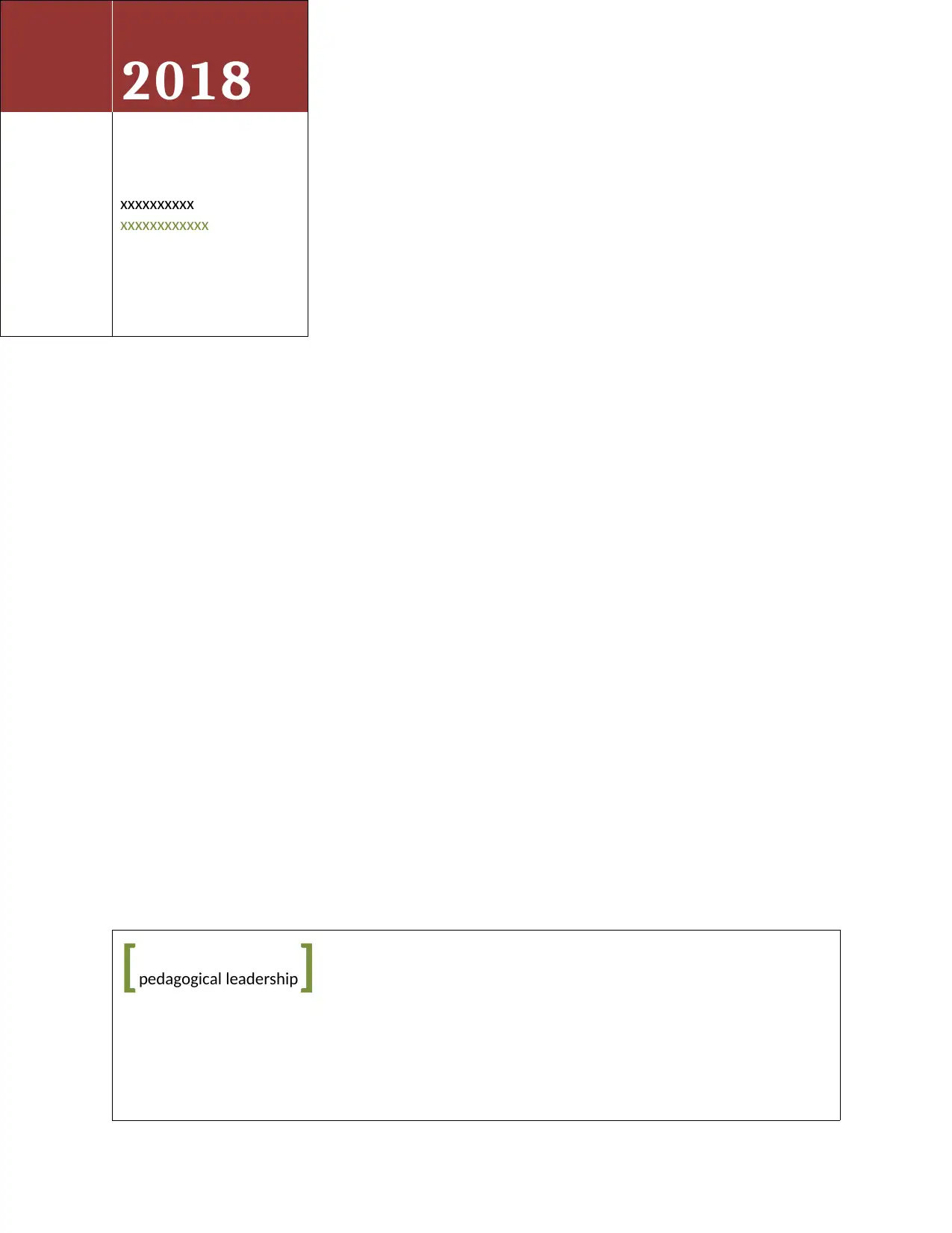
2018
xxxxxxxxxx
xxxxxxxxxxxx
[pedagogical leadership]
xxxxxxxxxx
xxxxxxxxxxxx
[pedagogical leadership]
Secure Best Marks with AI Grader
Need help grading? Try our AI Grader for instant feedback on your assignments.
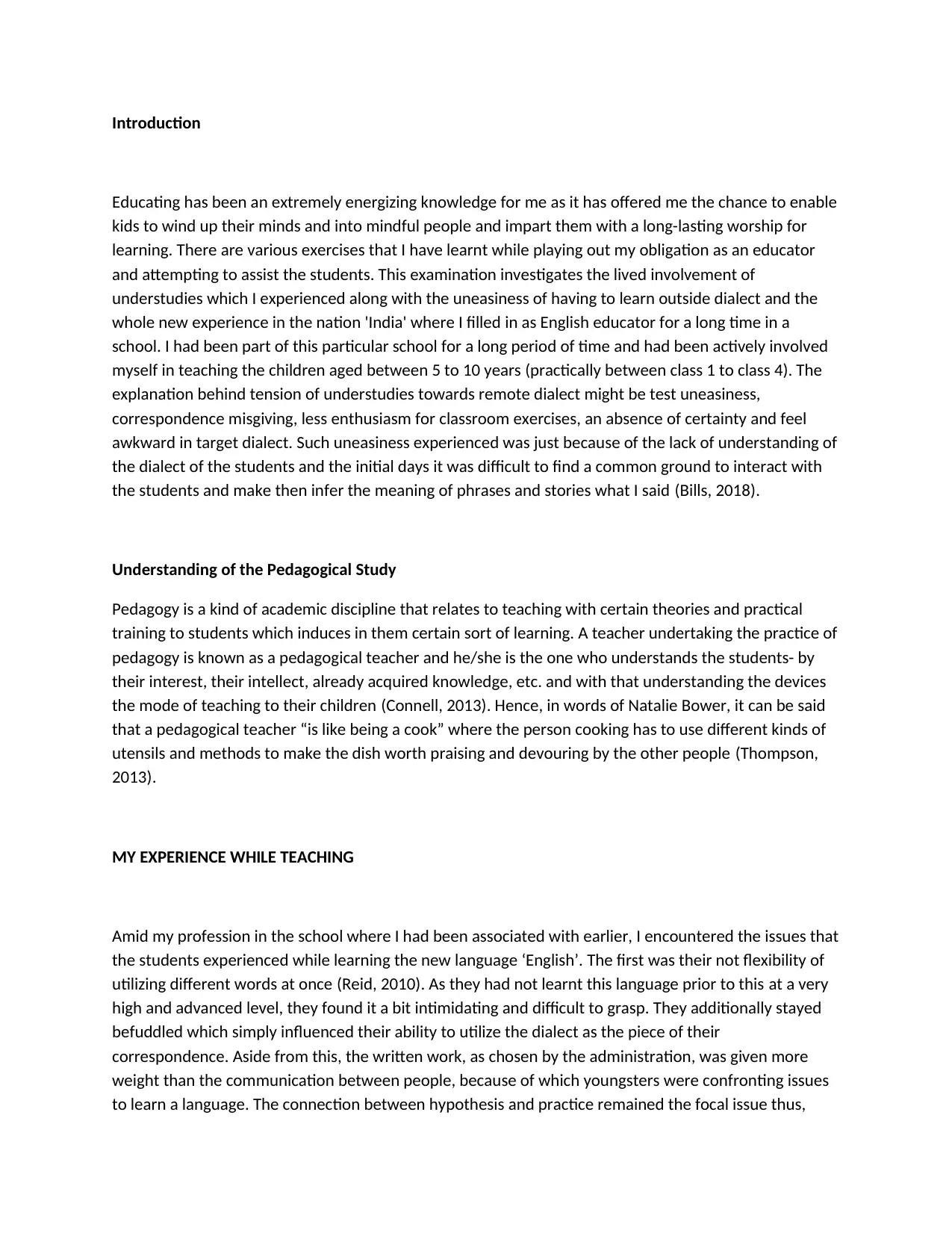
Introduction
Educating has been an extremely energizing knowledge for me as it has offered me the chance to enable
kids to wind up their minds and into mindful people and impart them with a long-lasting worship for
learning. There are various exercises that I have learnt while playing out my obligation as an educator
and attempting to assist the students. This examination investigates the lived involvement of
understudies which I experienced along with the uneasiness of having to learn outside dialect and the
whole new experience in the nation 'India' where I filled in as English educator for a long time in a
school. I had been part of this particular school for a long period of time and had been actively involved
myself in teaching the children aged between 5 to 10 years (practically between class 1 to class 4). The
explanation behind tension of understudies towards remote dialect might be test uneasiness,
correspondence misgiving, less enthusiasm for classroom exercises, an absence of certainty and feel
awkward in target dialect. Such uneasiness experienced was just because of the lack of understanding of
the dialect of the students and the initial days it was difficult to find a common ground to interact with
the students and make then infer the meaning of phrases and stories what I said (Bills, 2018).
Understanding of the Pedagogical Study
Pedagogy is a kind of academic discipline that relates to teaching with certain theories and practical
training to students which induces in them certain sort of learning. A teacher undertaking the practice of
pedagogy is known as a pedagogical teacher and he/she is the one who understands the students- by
their interest, their intellect, already acquired knowledge, etc. and with that understanding the devices
the mode of teaching to their children (Connell, 2013). Hence, in words of Natalie Bower, it can be said
that a pedagogical teacher “is like being a cook” where the person cooking has to use different kinds of
utensils and methods to make the dish worth praising and devouring by the other people (Thompson,
2013).
MY EXPERIENCE WHILE TEACHING
Amid my profession in the school where I had been associated with earlier, I encountered the issues that
the students experienced while learning the new language ‘English’. The first was their not flexibility of
utilizing different words at once (Reid, 2010). As they had not learnt this language prior to this at a very
high and advanced level, they found it a bit intimidating and difficult to grasp. They additionally stayed
befuddled which simply influenced their ability to utilize the dialect as the piece of their
correspondence. Aside from this, the written work, as chosen by the administration, was given more
weight than the communication between people, because of which youngsters were confronting issues
to learn a language. The connection between hypothesis and practice remained the focal issue thus,
Educating has been an extremely energizing knowledge for me as it has offered me the chance to enable
kids to wind up their minds and into mindful people and impart them with a long-lasting worship for
learning. There are various exercises that I have learnt while playing out my obligation as an educator
and attempting to assist the students. This examination investigates the lived involvement of
understudies which I experienced along with the uneasiness of having to learn outside dialect and the
whole new experience in the nation 'India' where I filled in as English educator for a long time in a
school. I had been part of this particular school for a long period of time and had been actively involved
myself in teaching the children aged between 5 to 10 years (practically between class 1 to class 4). The
explanation behind tension of understudies towards remote dialect might be test uneasiness,
correspondence misgiving, less enthusiasm for classroom exercises, an absence of certainty and feel
awkward in target dialect. Such uneasiness experienced was just because of the lack of understanding of
the dialect of the students and the initial days it was difficult to find a common ground to interact with
the students and make then infer the meaning of phrases and stories what I said (Bills, 2018).
Understanding of the Pedagogical Study
Pedagogy is a kind of academic discipline that relates to teaching with certain theories and practical
training to students which induces in them certain sort of learning. A teacher undertaking the practice of
pedagogy is known as a pedagogical teacher and he/she is the one who understands the students- by
their interest, their intellect, already acquired knowledge, etc. and with that understanding the devices
the mode of teaching to their children (Connell, 2013). Hence, in words of Natalie Bower, it can be said
that a pedagogical teacher “is like being a cook” where the person cooking has to use different kinds of
utensils and methods to make the dish worth praising and devouring by the other people (Thompson,
2013).
MY EXPERIENCE WHILE TEACHING
Amid my profession in the school where I had been associated with earlier, I encountered the issues that
the students experienced while learning the new language ‘English’. The first was their not flexibility of
utilizing different words at once (Reid, 2010). As they had not learnt this language prior to this at a very
high and advanced level, they found it a bit intimidating and difficult to grasp. They additionally stayed
befuddled which simply influenced their ability to utilize the dialect as the piece of their
correspondence. Aside from this, the written work, as chosen by the administration, was given more
weight than the communication between people, because of which youngsters were confronting issues
to learn a language. The connection between hypothesis and practice remained the focal issue thus,
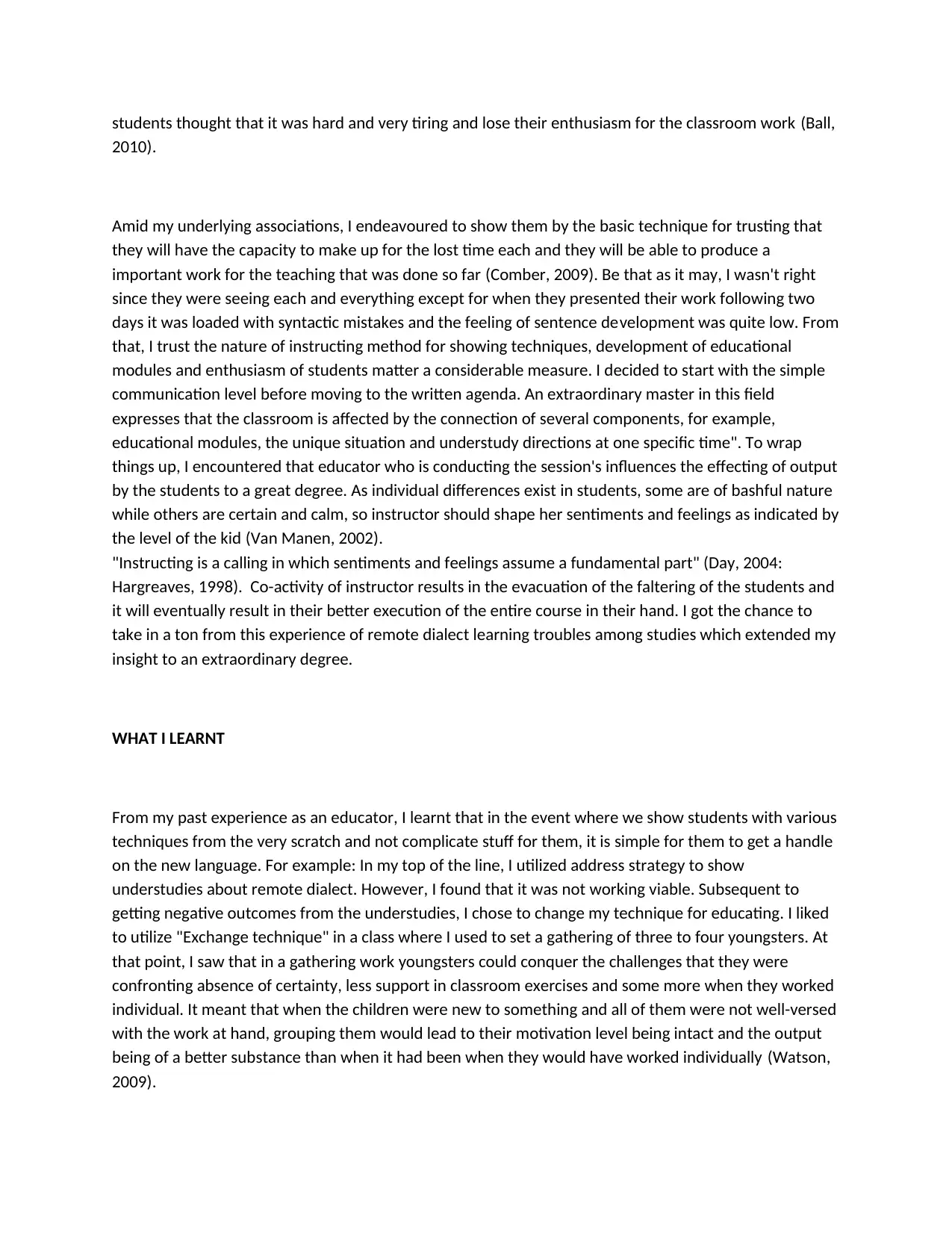
students thought that it was hard and very tiring and lose their enthusiasm for the classroom work (Ball,
2010).
Amid my underlying associations, I endeavoured to show them by the basic technique for trusting that
they will have the capacity to make up for the lost time each and they will be able to produce a
important work for the teaching that was done so far (Comber, 2009). Be that as it may, I wasn't right
since they were seeing each and everything except for when they presented their work following two
days it was loaded with syntactic mistakes and the feeling of sentence development was quite low. From
that, I trust the nature of instructing method for showing techniques, development of educational
modules and enthusiasm of students matter a considerable measure. I decided to start with the simple
communication level before moving to the written agenda. An extraordinary master in this field
expresses that the classroom is affected by the connection of several components, for example,
educational modules, the unique situation and understudy directions at one specific time". To wrap
things up, I encountered that educator who is conducting the session's influences the effecting of output
by the students to a great degree. As individual differences exist in students, some are of bashful nature
while others are certain and calm, so instructor should shape her sentiments and feelings as indicated by
the level of the kid (Van Manen, 2002).
"Instructing is a calling in which sentiments and feelings assume a fundamental part" (Day, 2004:
Hargreaves, 1998). Co-activity of instructor results in the evacuation of the faltering of the students and
it will eventually result in their better execution of the entire course in their hand. I got the chance to
take in a ton from this experience of remote dialect learning troubles among studies which extended my
insight to an extraordinary degree.
WHAT I LEARNT
From my past experience as an educator, I learnt that in the event where we show students with various
techniques from the very scratch and not complicate stuff for them, it is simple for them to get a handle
on the new language. For example: In my top of the line, I utilized address strategy to show
understudies about remote dialect. However, I found that it was not working viable. Subsequent to
getting negative outcomes from the understudies, I chose to change my technique for educating. I liked
to utilize "Exchange technique" in a class where I used to set a gathering of three to four youngsters. At
that point, I saw that in a gathering work youngsters could conquer the challenges that they were
confronting absence of certainty, less support in classroom exercises and some more when they worked
individual. It meant that when the children were new to something and all of them were not well-versed
with the work at hand, grouping them would lead to their motivation level being intact and the output
being of a better substance than when it had been when they would have worked individually (Watson,
2009).
2010).
Amid my underlying associations, I endeavoured to show them by the basic technique for trusting that
they will have the capacity to make up for the lost time each and they will be able to produce a
important work for the teaching that was done so far (Comber, 2009). Be that as it may, I wasn't right
since they were seeing each and everything except for when they presented their work following two
days it was loaded with syntactic mistakes and the feeling of sentence development was quite low. From
that, I trust the nature of instructing method for showing techniques, development of educational
modules and enthusiasm of students matter a considerable measure. I decided to start with the simple
communication level before moving to the written agenda. An extraordinary master in this field
expresses that the classroom is affected by the connection of several components, for example,
educational modules, the unique situation and understudy directions at one specific time". To wrap
things up, I encountered that educator who is conducting the session's influences the effecting of output
by the students to a great degree. As individual differences exist in students, some are of bashful nature
while others are certain and calm, so instructor should shape her sentiments and feelings as indicated by
the level of the kid (Van Manen, 2002).
"Instructing is a calling in which sentiments and feelings assume a fundamental part" (Day, 2004:
Hargreaves, 1998). Co-activity of instructor results in the evacuation of the faltering of the students and
it will eventually result in their better execution of the entire course in their hand. I got the chance to
take in a ton from this experience of remote dialect learning troubles among studies which extended my
insight to an extraordinary degree.
WHAT I LEARNT
From my past experience as an educator, I learnt that in the event where we show students with various
techniques from the very scratch and not complicate stuff for them, it is simple for them to get a handle
on the new language. For example: In my top of the line, I utilized address strategy to show
understudies about remote dialect. However, I found that it was not working viable. Subsequent to
getting negative outcomes from the understudies, I chose to change my technique for educating. I liked
to utilize "Exchange technique" in a class where I used to set a gathering of three to four youngsters. At
that point, I saw that in a gathering work youngsters could conquer the challenges that they were
confronting absence of certainty, less support in classroom exercises and some more when they worked
individual. It meant that when the children were new to something and all of them were not well-versed
with the work at hand, grouping them would lead to their motivation level being intact and the output
being of a better substance than when it had been when they would have worked individually (Watson,
2009).
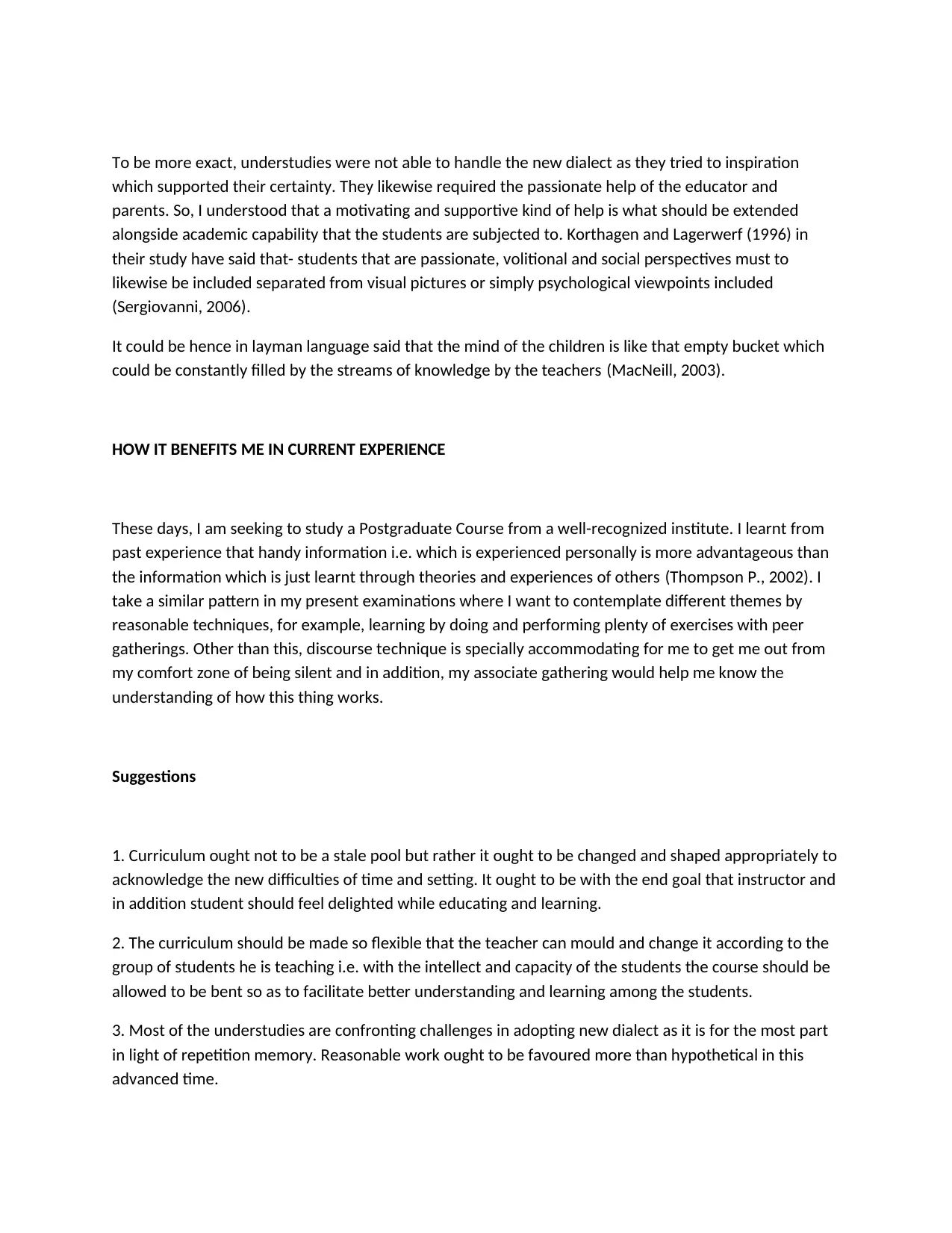
To be more exact, understudies were not able to handle the new dialect as they tried to inspiration
which supported their certainty. They likewise required the passionate help of the educator and
parents. So, I understood that a motivating and supportive kind of help is what should be extended
alongside academic capability that the students are subjected to. Korthagen and Lagerwerf (1996) in
their study have said that- students that are passionate, volitional and social perspectives must to
likewise be included separated from visual pictures or simply psychological viewpoints included
(Sergiovanni, 2006).
It could be hence in layman language said that the mind of the children is like that empty bucket which
could be constantly filled by the streams of knowledge by the teachers (MacNeill, 2003).
HOW IT BENEFITS ME IN CURRENT EXPERIENCE
These days, I am seeking to study a Postgraduate Course from a well-recognized institute. I learnt from
past experience that handy information i.e. which is experienced personally is more advantageous than
the information which is just learnt through theories and experiences of others (Thompson P., 2002). I
take a similar pattern in my present examinations where I want to contemplate different themes by
reasonable techniques, for example, learning by doing and performing plenty of exercises with peer
gatherings. Other than this, discourse technique is specially accommodating for me to get me out from
my comfort zone of being silent and in addition, my associate gathering would help me know the
understanding of how this thing works.
Suggestions
1. Curriculum ought not to be a stale pool but rather it ought to be changed and shaped appropriately to
acknowledge the new difficulties of time and setting. It ought to be with the end goal that instructor and
in addition student should feel delighted while educating and learning.
2. The curriculum should be made so flexible that the teacher can mould and change it according to the
group of students he is teaching i.e. with the intellect and capacity of the students the course should be
allowed to be bent so as to facilitate better understanding and learning among the students.
3. Most of the understudies are confronting challenges in adopting new dialect as it is for the most part
in light of repetition memory. Reasonable work ought to be favoured more than hypothetical in this
advanced time.
which supported their certainty. They likewise required the passionate help of the educator and
parents. So, I understood that a motivating and supportive kind of help is what should be extended
alongside academic capability that the students are subjected to. Korthagen and Lagerwerf (1996) in
their study have said that- students that are passionate, volitional and social perspectives must to
likewise be included separated from visual pictures or simply psychological viewpoints included
(Sergiovanni, 2006).
It could be hence in layman language said that the mind of the children is like that empty bucket which
could be constantly filled by the streams of knowledge by the teachers (MacNeill, 2003).
HOW IT BENEFITS ME IN CURRENT EXPERIENCE
These days, I am seeking to study a Postgraduate Course from a well-recognized institute. I learnt from
past experience that handy information i.e. which is experienced personally is more advantageous than
the information which is just learnt through theories and experiences of others (Thompson P., 2002). I
take a similar pattern in my present examinations where I want to contemplate different themes by
reasonable techniques, for example, learning by doing and performing plenty of exercises with peer
gatherings. Other than this, discourse technique is specially accommodating for me to get me out from
my comfort zone of being silent and in addition, my associate gathering would help me know the
understanding of how this thing works.
Suggestions
1. Curriculum ought not to be a stale pool but rather it ought to be changed and shaped appropriately to
acknowledge the new difficulties of time and setting. It ought to be with the end goal that instructor and
in addition student should feel delighted while educating and learning.
2. The curriculum should be made so flexible that the teacher can mould and change it according to the
group of students he is teaching i.e. with the intellect and capacity of the students the course should be
allowed to be bent so as to facilitate better understanding and learning among the students.
3. Most of the understudies are confronting challenges in adopting new dialect as it is for the most part
in light of repetition memory. Reasonable work ought to be favoured more than hypothetical in this
advanced time.
Secure Best Marks with AI Grader
Need help grading? Try our AI Grader for instant feedback on your assignments.
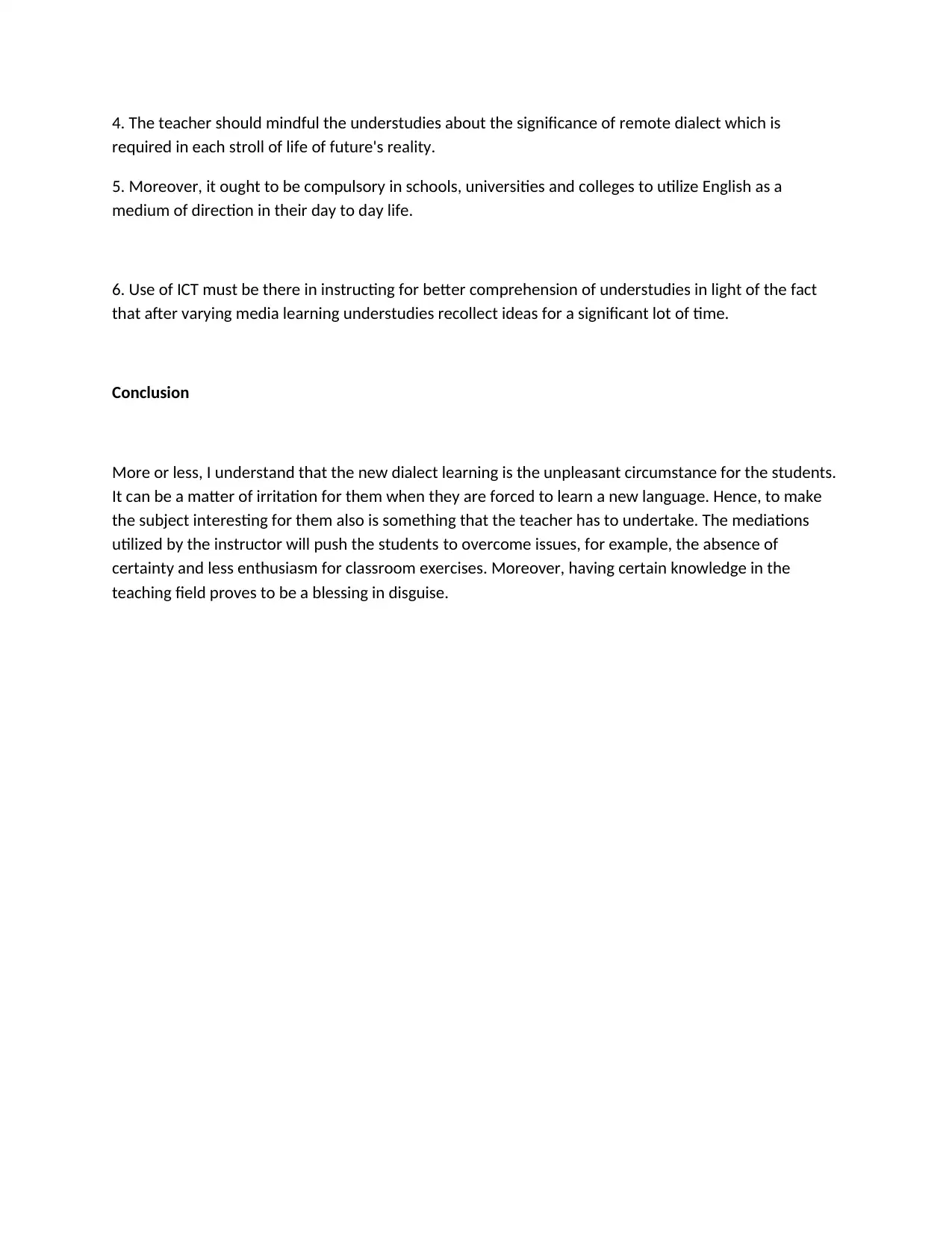
4. The teacher should mindful the understudies about the significance of remote dialect which is
required in each stroll of life of future's reality.
5. Moreover, it ought to be compulsory in schools, universities and colleges to utilize English as a
medium of direction in their day to day life.
6. Use of ICT must be there in instructing for better comprehension of understudies in light of the fact
that after varying media learning understudies recollect ideas for a significant lot of time.
Conclusion
More or less, I understand that the new dialect learning is the unpleasant circumstance for the students.
It can be a matter of irritation for them when they are forced to learn a new language. Hence, to make
the subject interesting for them also is something that the teacher has to undertake. The mediations
utilized by the instructor will push the students to overcome issues, for example, the absence of
certainty and less enthusiasm for classroom exercises. Moreover, having certain knowledge in the
teaching field proves to be a blessing in disguise.
required in each stroll of life of future's reality.
5. Moreover, it ought to be compulsory in schools, universities and colleges to utilize English as a
medium of direction in their day to day life.
6. Use of ICT must be there in instructing for better comprehension of understudies in light of the fact
that after varying media learning understudies recollect ideas for a significant lot of time.
Conclusion
More or less, I understand that the new dialect learning is the unpleasant circumstance for the students.
It can be a matter of irritation for them when they are forced to learn a new language. Hence, to make
the subject interesting for them also is something that the teacher has to undertake. The mediations
utilized by the instructor will push the students to overcome issues, for example, the absence of
certainty and less enthusiasm for classroom exercises. Moreover, having certain knowledge in the
teaching field proves to be a blessing in disguise.
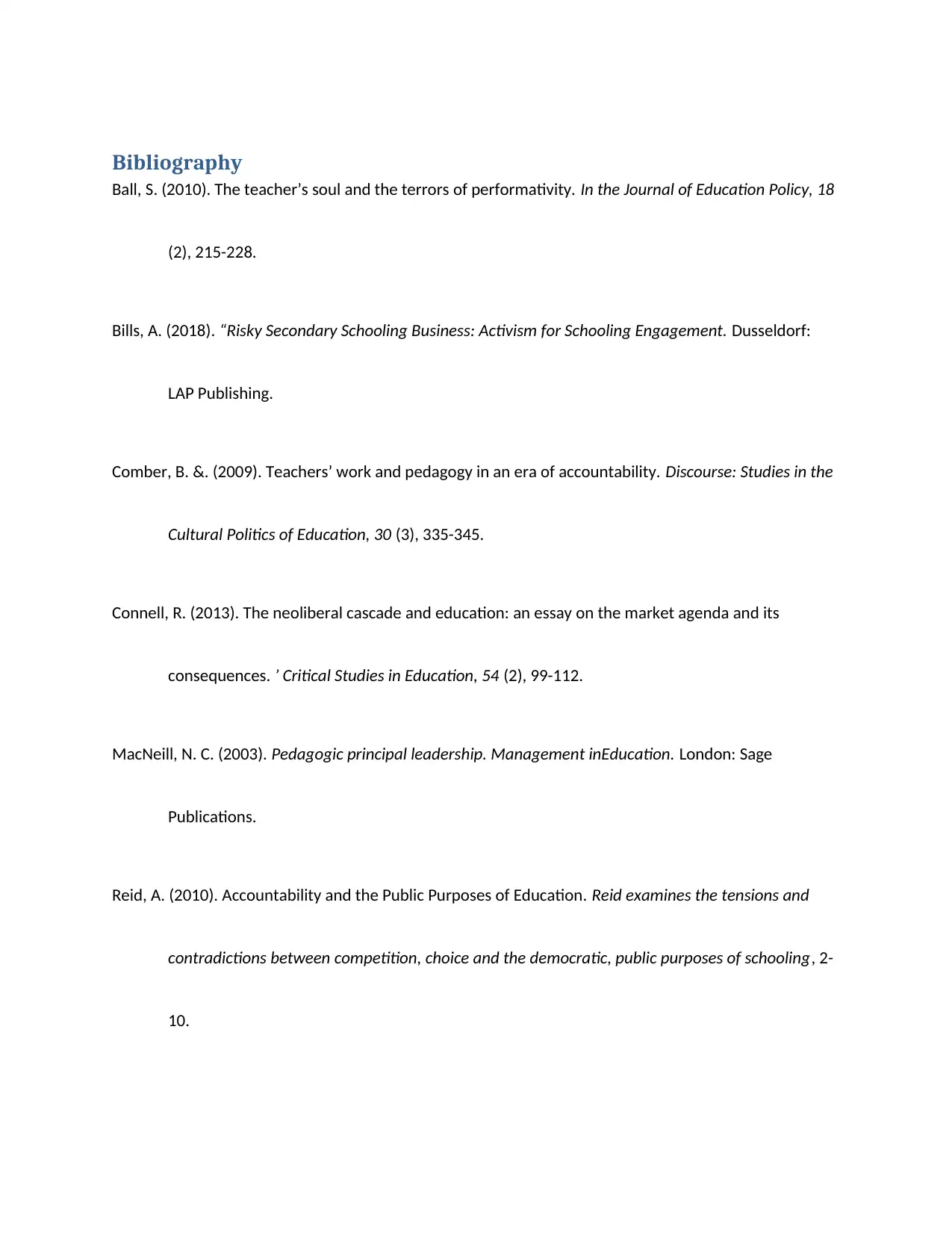
Bibliography
Ball, S. (2010). The teacher’s soul and the terrors of performativity. In the Journal of Education Policy, 18
(2), 215-228.
Bills, A. (2018). “Risky Secondary Schooling Business: Activism for Schooling Engagement. Dusseldorf:
LAP Publishing.
Comber, B. &. (2009). Teachers’ work and pedagogy in an era of accountability. Discourse: Studies in the
Cultural Politics of Education, 30 (3), 335-345.
Connell, R. (2013). The neoliberal cascade and education: an essay on the market agenda and its
consequences. ’ Critical Studies in Education, 54 (2), 99-112.
MacNeill, N. C. (2003). Pedagogic principal leadership. Management inEducation. London: Sage
Publications.
Reid, A. (2010). Accountability and the Public Purposes of Education. Reid examines the tensions and
contradictions between competition, choice and the democratic, public purposes of schooling, 2-
10.
Ball, S. (2010). The teacher’s soul and the terrors of performativity. In the Journal of Education Policy, 18
(2), 215-228.
Bills, A. (2018). “Risky Secondary Schooling Business: Activism for Schooling Engagement. Dusseldorf:
LAP Publishing.
Comber, B. &. (2009). Teachers’ work and pedagogy in an era of accountability. Discourse: Studies in the
Cultural Politics of Education, 30 (3), 335-345.
Connell, R. (2013). The neoliberal cascade and education: an essay on the market agenda and its
consequences. ’ Critical Studies in Education, 54 (2), 99-112.
MacNeill, N. C. (2003). Pedagogic principal leadership. Management inEducation. London: Sage
Publications.
Reid, A. (2010). Accountability and the Public Purposes of Education. Reid examines the tensions and
contradictions between competition, choice and the democratic, public purposes of schooling, 2-
10.
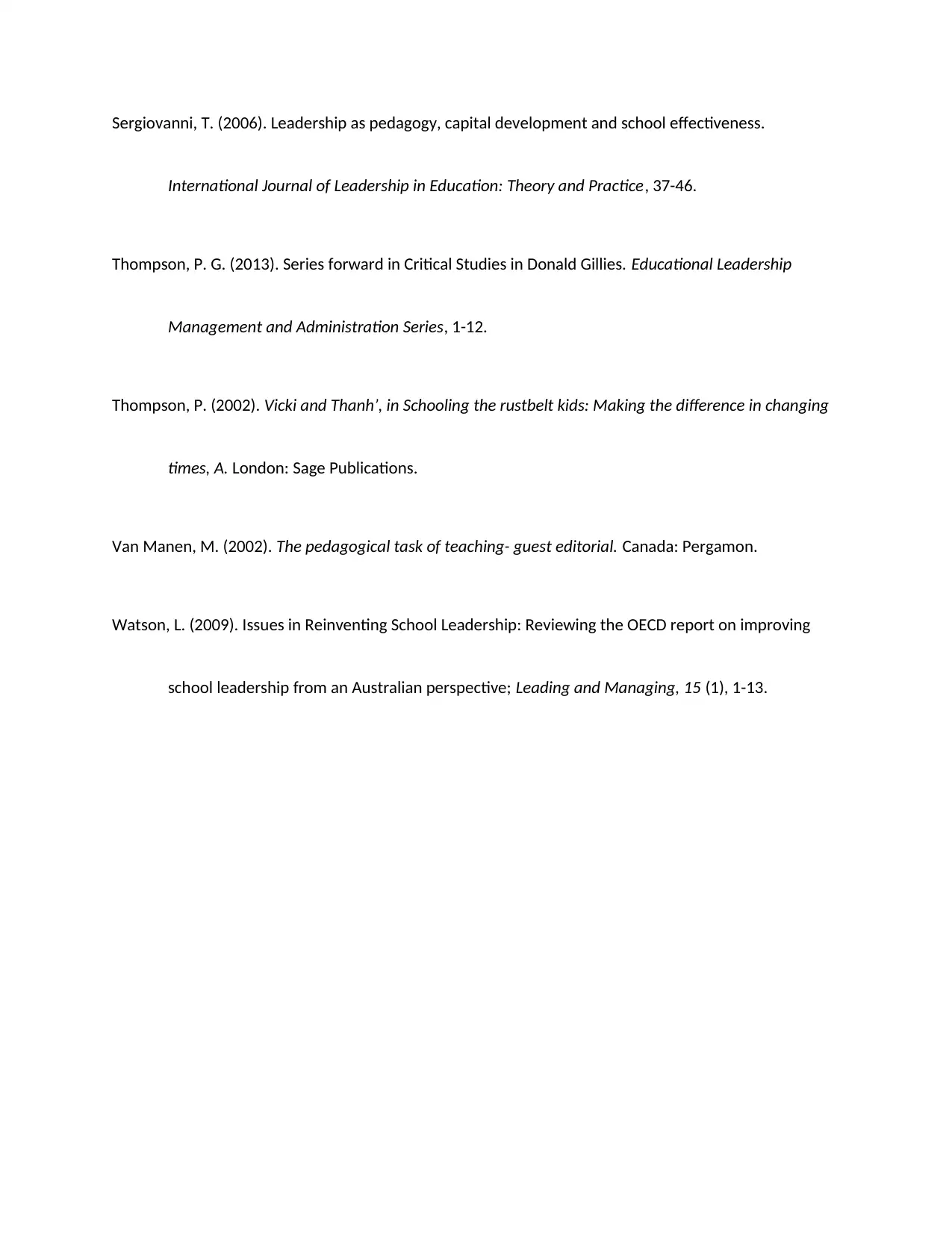
Sergiovanni, T. (2006). Leadership as pedagogy, capital development and school effectiveness.
International Journal of Leadership in Education: Theory and Practice, 37-46.
Thompson, P. G. (2013). Series forward in Critical Studies in Donald Gillies. Educational Leadership
Management and Administration Series, 1-12.
Thompson, P. (2002). Vicki and Thanh’, in Schooling the rustbelt kids: Making the difference in changing
times, A. London: Sage Publications.
Van Manen, M. (2002). The pedagogical task of teaching- guest editorial. Canada: Pergamon.
Watson, L. (2009). Issues in Reinventing School Leadership: Reviewing the OECD report on improving
school leadership from an Australian perspective; Leading and Managing, 15 (1), 1-13.
International Journal of Leadership in Education: Theory and Practice, 37-46.
Thompson, P. G. (2013). Series forward in Critical Studies in Donald Gillies. Educational Leadership
Management and Administration Series, 1-12.
Thompson, P. (2002). Vicki and Thanh’, in Schooling the rustbelt kids: Making the difference in changing
times, A. London: Sage Publications.
Van Manen, M. (2002). The pedagogical task of teaching- guest editorial. Canada: Pergamon.
Watson, L. (2009). Issues in Reinventing School Leadership: Reviewing the OECD report on improving
school leadership from an Australian perspective; Leading and Managing, 15 (1), 1-13.
1 out of 7
Related Documents
Your All-in-One AI-Powered Toolkit for Academic Success.
+13062052269
info@desklib.com
Available 24*7 on WhatsApp / Email
![[object Object]](/_next/static/media/star-bottom.7253800d.svg)
Unlock your academic potential
© 2024 | Zucol Services PVT LTD | All rights reserved.





